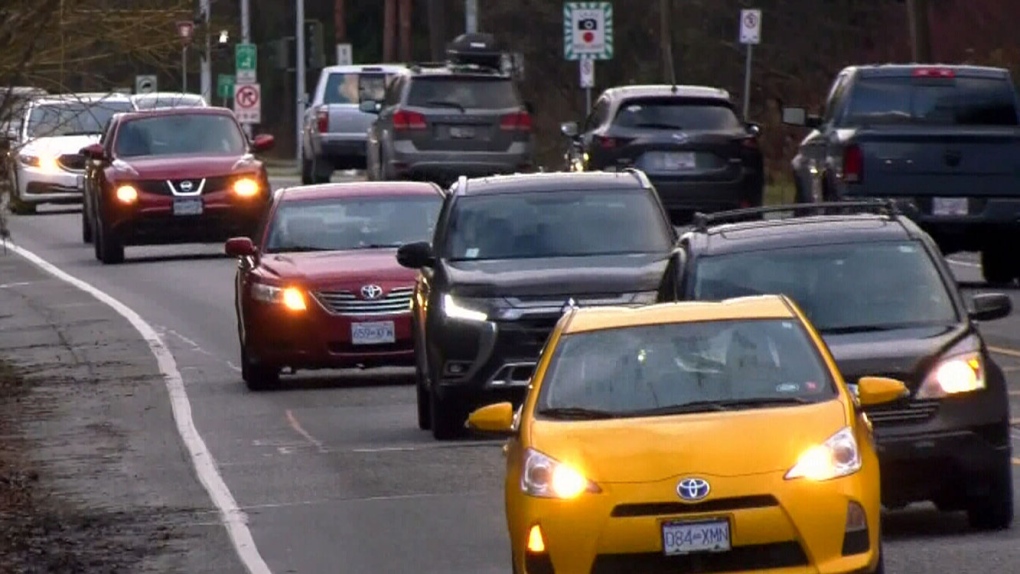Should speed limits be lower? B.C. residents asked about 30 km/h zones

A new poll suggests about two-thirds of British Columbians support lowering the speed limit in residential areas to 30 km/h.
Sixty-six per cent of respondents to an online survey conducted by Research Co. say they would "definitely" or "probably" like to see the speed limit reduced on residential streets, while keeping the speed limit on arterial and collector roads at 50 km/h.
That's an eight per cent jump from 2019, when 58 per cent expressed interest in lowering the speed limit in neighbourhoods.
The poll also suggests more women are on board with lowering the speed limit (68 per cent) than men (63 per cent).
Age also played a factor. Results from the poll show while seven-in-ten of B.C. residents aged 18 to 34 would welcome the regulation (70 per cent), the rating is lower among their counterparts aged 35 to 54 (65 per cent) and those 55 and up (62 per cent).
When divided by region, the poll suggests the idea of lowering the residential speed limit was most popular in southern B.C. (72 per cent).
Metro Vancouver and northern B.C. are slightly behind (both tied at 67 per cent), followed by the Fraser Valley (63 per cent) and Vancouver Island (58 per cent).
A speed limit of 30 km/h is already in effect in Vancouver's Grandview-Woodland neighbourhood, after the city passed a motion in 2019 to establish a pilot project to reduce the speed limit on select residential streets.
The poll found more than seven-in-ten British Columbians believe Vancouver's pilot project is a "very good" or "good idea."
Nearly two-in-five residents (39 per cent) say they witness cars going above the current speed limit on the street they live "at least once a day," researchers say.
Twenty-nine per cent of respondents say they witness speeding vehicles "a few times a week," while 18 per cent answered "a few times a month" and 15 per cent say "never."
The online poll was conducted from June 3 to 5 among 800 adults in B.C. It has a margin of error of plus or minus 3.5 per cent, 19 times out of 20.
CTVNews.ca Top Stories

Downtown Vancouver stabbing suspect dead after being shot by police
A suspect is dead after being shot by police in a Vancouver convenience store after two people were injured in a stabbing Wednesday morning, according to authorities.
2 Canadians confirmed dead in Poland, as consular officials gather information
Two Canadians have died following an incident in Poland, CTV News has learned.
Ontario Premier Doug Ford calls Donald Trump 'funny guy' in Fox News interview
Ontario Premier Doug Ford called U.S. president-elect Donald Trump a 'funny guy' on Wednesday in an interview with Fox News for his comment that Canada should become the United States's 51st state.
DEVELOPING As police search for suspect, disturbing video surfaces after U.S. health-care CEO gunned down in New York
UnitedHealthcare CEO Brian Thompson was killed Wednesday morning in what investigators suspect was a targeted shooting outside a Manhattan hotel where the health insurer was holding an investor conference.
Toddler fatally shot after his 7-year-old brother finds a gun in the family's truck
A two-year-old boy was fatally shot when his seven-year-old brother found a gun in the glovebox of the family's truck in Southern California, authorities said.
Millions in Cuba remain in dark after nationwide blackout
Cuba said it was generating only enough electricity to cover about 1/6th of peak demand late on Wednesday, hours after its national grid collapsed leaving millions without power.
'Utterly absurd': Freeland rebuffs Poilievre's offer of two hours to present fall economic statement
Deputy Prime Minister and Finance Minister Chrystia Freeland has rebuffed Conservative Leader Pierre Poilievre's offer to give up two hours of scheduled opposition time next Monday to present the awaited fall economic statement as 'utterly absurd.'
Canada Post stores continue to operate during strike — but why?
As many postal workers continue to strike across the country, some Canadians have been puzzled by the fact some Canada Post offices and retail outlets remain open.
Mattel sued over 'Wicked' dolls with porn website link
Mattel was sued this week by a South Carolina mother for mistakenly putting a link to an adult film site on the packaging for its dolls tied to the movie 'Wicked.'
































